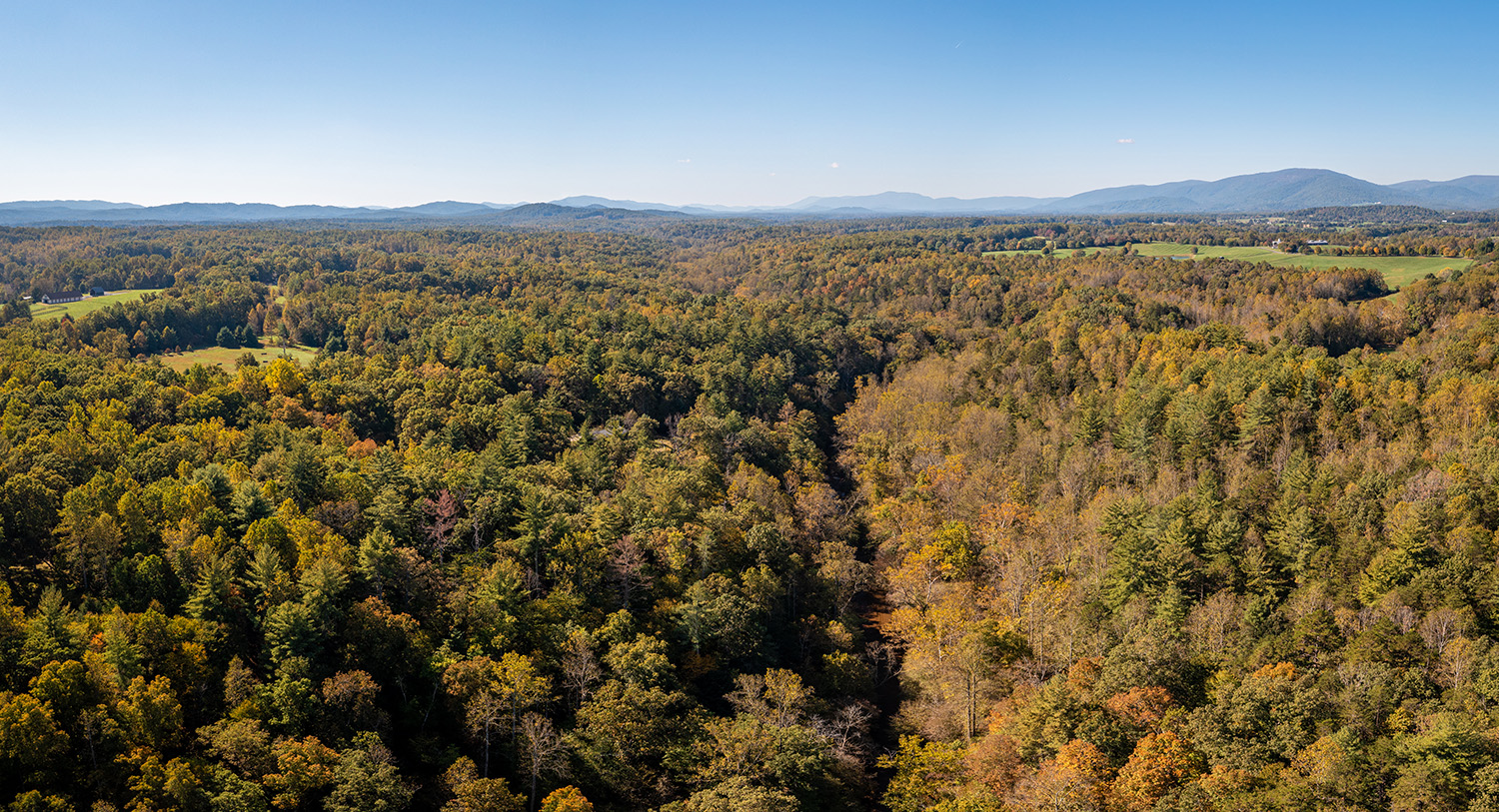Contact:
Mike Kane, Director of Land Conservation
mkane@pecva.org; 540-347-2337, x7063

PIEDMONT REGION, VA. (Feb. 14, 2022) – Last year, landowners partnered with The Piedmont Environmental Council (PEC) and other land trusts and conservation agencies to permanently protect 6,651 acres of land in Albemarle, Clarke, Culpeper, Fauquier, Greene, Loudoun, Orange and Rappahannock counties. The 50 new conservation easements in 2022 bring the total amount of land protected by conservation easement in PEC’s nine-county region to 439,782 acres. PEC accepted three of the new easements, while many other conservation organizations, including the Virginia Outdoors Foundation, the Albemarle Conservation Easement Authority, the Clarke County Conservation Easement Authority, and the Land Trust of Virginia, accepted the remainder.
“Conserved lands provide the important public benefits of clean air and drinking water, natural flood controls and carbon reduction, wildlife habitat, scenic views that attract millions to the region, and strong agricultural, forestry and recreational economies,” said PEC President Chris Miller. “Virginia is fortunate that so many families have the desire to preserve its invaluable open spaces and that so many conservation organizations and agencies are willing and able to shepherd them through the process of permanent land protection,” he said.
Eleven properties were conserved last year in Albemarle County, nine with the Albemarle Conservation Easement Authority and two with the Land Trust of Virginia. With over 1,700 acres of land protected this past year and 111,305 total acres conserved, Albemarle now has more lands under conservation easements than any other locality in the Commonwealth.
“This success is the direct result of decades of effort on the part of conservation organizations in the region, and particularly the County’s own land conservation programs, which have intentionally made conservation an option for landowners of all income levels,” said PEC Senior Conservation Field Representative Kim Biasiolli. “Maintaining and increasing support for the Albemarle Conservation Easement Authority and reinvigorating the County’s Purchase of Development Rights program is more important now than it’s ever been. Right now we have this opportunity through the Comprehensive Plan update, during which community members have the chance to reflect on the value of natural lands and recognize the importance of these programs.”
Biasiolli says that while the numbers are something to be proud of, there is much more work to be done to address the County’s strategic goals for climate resiliency, water resource protection and biodiversity conservation. “Albemarle’s land conservation programs are some of the most effective tools we have to advance these goals, and we know that they work. As an example, conservation easements in the county have protected 484 miles of streams and nearly 1,500 acres of wetlands to date. It’s a significant cumulative impact, and each year that impact continues to grow. The County’s conserved lands provide tremendous public benefits by protecting not just the quality of water resources and the public water supply, but forests and farmland, wildlife habitat, and the scenic beauty that surrounds us,” she said.
“The challenge is to ensure that the abundant public benefit of the Piedmont’s exceptional resources are available for future generations,” says PEC Director of Conservation Mike Kane. “As such, PEC has a goal of working with landowners and other conservation organizations to protect one million acres, representing about half of the land in our nine-county service area. We believe this goal is achievable. The tremendous interest landowners have expressed in voluntary land conservation over the past generation, combined with continuing commitment on the part of both PEC and our preservation allies make this possible,” he said.
A conservation easement is a voluntary agreement between a landowner and a public agency or a nonprofit conservation group, such as The Piedmont Environmental Council. As part of a suite of public policies ranging from local comprehensive plans to the multi-state Chesapeake Bay agreement, conservation easements provide important benefits to the public. For more information about conservation easements, visit: pecva.org/easements.
A regional map of private and protected lands in the nine-county region can be downloaded here. County-by-county maps detailing conservation easement totals and easements added in the year 2022 within The Piedmont Environmental Council region can be downloaded here. County-by-county conservation totals are as follows:
County | Acres Protected in 2022 by Conservation Easements * | Total Acres Protected by Conservation Easements * |
| Albemarle | 1,715 | 111,305 |
| Clarke | 816 | 27,602 |
| Culpeper | 155 | 21,430 |
| Fauquier | 735 | 110,561 |
| Greene | 140 | 10,787 |
| Loudoun | 1,675 | 67,866 |
| Madison | 0 | 16,365 |
| Orange | 1,309 | 40,203 |
| Rappahannock | 106 | 33,662 |
| PEC REGION | 6,650 | 439,782 |
In Albemarle County, conservation easements in 2022 protected approximately:
- 37.2 acres of wetlands;
- 1,161.8 acres of forests;
- 1,462.9 acres in historic districts;
- 6.1 miles of streams;
- 188.9 acres in the viewshed of the Appalachian Trail;
- 759.5 acres of prime farmland soils;
- 75.2 acres adjacent to scenic rivers; and
- 1,320.9 acres along scenic byways.
In total, conservation easements in these nine counties have protected approximately (in rounded acreage):
- 10,695.4 acres of wetlands;
- 207,323.8 acres of forests;
- 31,696.6 acres of battlefields;
- 137,428.4 acres in historic districts
- 1,819.3 miles of streams;
- 131,446.1 acres in the viewshed of the Appalachian Trail;
- 209,028.2 acres of prime farmland soils;
- 27,802.6 acres adjacent to scenic rivers; and
- 116,696 acres along scenic byways.
Since 1972, The Piedmont Environmental Council has proudly promoted and protected the natural resources, rural economy, history and beauty of the Virginia Piedmont. PEC empowers residents to protect what makes the Piedmont a wonderful place, and works with citizens to conserve land, improve air and water quality and build thriving communities. PEC is a 501(c)(3) non-profit and accredited land trust. Learn more at www.pecva.org.
